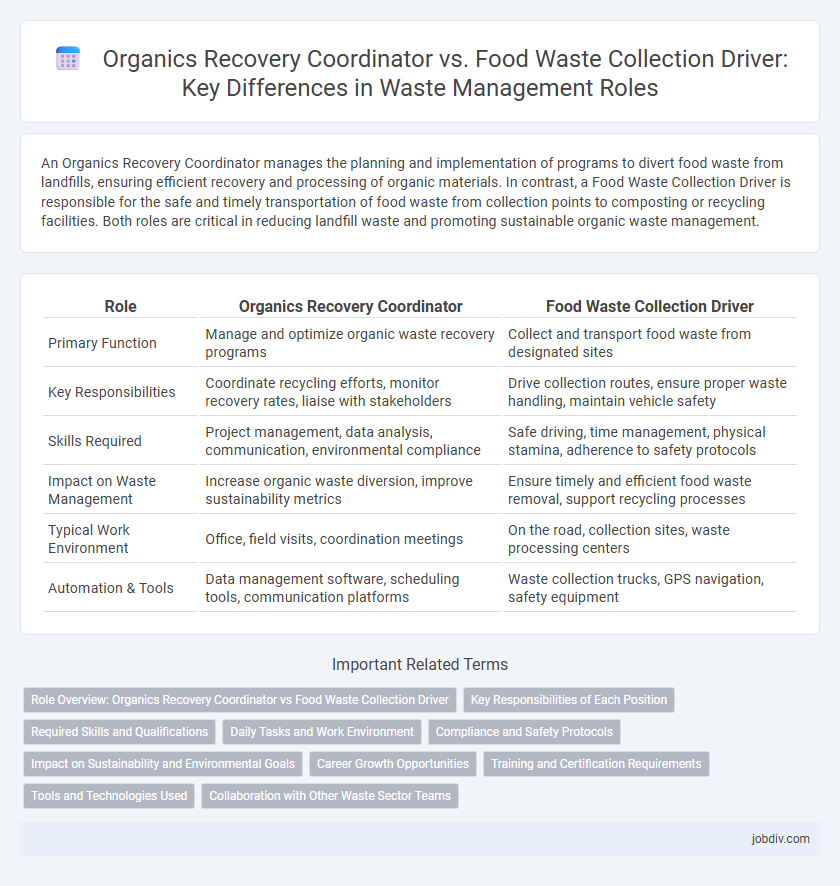An Organics Recovery Coordinator manages the planning and implementation of programs to divert food waste from landfills, ensuring efficient recovery and processing of organic materials. In contrast, a Food Waste Collection Driver is responsible for the safe and timely transportation of food waste from collection points to composting or recycling facilities. Both roles are critical in reducing landfill waste and promoting sustainable organic waste management.
Table of Comparison
| Role | Organics Recovery Coordinator | Food Waste Collection Driver |
|---|---|---|
| Primary Function | Manage and optimize organic waste recovery programs | Collect and transport food waste from designated sites |
| Key Responsibilities | Coordinate recycling efforts, monitor recovery rates, liaise with stakeholders | Drive collection routes, ensure proper waste handling, maintain vehicle safety |
| Skills Required | Project management, data analysis, communication, environmental compliance | Safe driving, time management, physical stamina, adherence to safety protocols |
| Impact on Waste Management | Increase organic waste diversion, improve sustainability metrics | Ensure timely and efficient food waste removal, support recycling processes |
| Typical Work Environment | Office, field visits, coordination meetings | On the road, collection sites, waste processing centers |
| Automation & Tools | Data management software, scheduling tools, communication platforms | Waste collection trucks, GPS navigation, safety equipment |
Role Overview: Organics Recovery Coordinator vs Food Waste Collection Driver
The Organics Recovery Coordinator manages the planning and execution of programs aimed at diverting organic waste from landfills, focusing on optimizing recovery processes and ensuring regulatory compliance. In contrast, the Food Waste Collection Driver is responsible for the safe and efficient transportation of collected food waste from origin points to processing facilities. Both roles are essential for effective waste management but differ significantly in strategic oversight versus operational execution.
Key Responsibilities of Each Position
The Organics Recovery Coordinator manages the planning and implementation of organic waste diversion programs, oversees compliance with environmental regulations, and coordinates with local agencies to optimize composting operations. The Food Waste Collection Driver is responsible for safely operating collection vehicles, adhering to scheduled routes, and ensuring the efficient transport of food waste to processing facilities. Both roles are critical in reducing landfill contributions and enhancing sustainable waste management practices.
Required Skills and Qualifications
Organics Recovery Coordinators require expertise in environmental regulations, project management, and community outreach to optimize composting programs and ensure compliance. Food Waste Collection Drivers need strong knowledge of vehicle operation, route navigation, and waste handling safety standards to efficiently collect organic waste. Both roles demand attention to detail, physical stamina, and commitment to sustainability in organic waste management.
Daily Tasks and Work Environment
An Organics Recovery Coordinator manages waste diversion programs by overseeing composting processes, coordinating with facilities, and ensuring compliance with environmental regulations, often working in office settings combined with field visits. A Food Waste Collection Driver operates specialized trucks to collect organic waste from residential and commercial clients, requiring physical activity and adherence to safety protocols in outdoor environments. Both roles support sustainable waste management but differ in operational focus, with the coordinator emphasizing program logistics and the driver handling hands-on collection tasks.
Compliance and Safety Protocols
Organics Recovery Coordinators ensure strict adherence to regulatory compliance and safety protocols by overseeing the proper sorting and processing of organic waste to minimize contamination risks. Food Waste Collection Drivers follow established safety guidelines during collection routes, including proper vehicle maintenance and use of personal protective equipment to prevent accidents and exposure. Both roles collaborate to maintain compliance with environmental regulations and workplace safety standards within the waste management industry.
Impact on Sustainability and Environmental Goals
Organics Recovery Coordinators play a crucial role in enhancing sustainability by overseeing the efficient sorting and processing of organic waste, which reduces landfill use and lowers greenhouse gas emissions. Food Waste Collection Drivers directly contribute to environmental goals by ensuring timely collection and transportation of organic waste to composting or recycling facilities, minimizing contamination and promoting nutrient recovery. Both positions are essential in supporting circular economy principles and advancing zero-waste targets through streamlined organic waste management.
Career Growth Opportunities
Organics Recovery Coordinators oversee waste diversion programs, gaining expertise in environmental compliance and community engagement that open pathways to senior sustainability roles and policy development positions. Food Waste Collection Drivers acquire hands-on experience in logistics and operational efficiency, positioning themselves for advancement into fleet management or supervisory roles within waste management companies. Both careers offer distinct growth trajectories, with coordinators leaning toward strategic planning and drivers toward operational leadership.
Training and Certification Requirements
Organics Recovery Coordinators typically require specialized training in waste diversion strategies, composting processes, and environmental regulations, often holding certifications such as the Compost Operator Certification or Zero Waste Specialist credentials. Food Waste Collection Drivers need commercial driver's licenses (CDL) with endorsements for operating heavy vehicles and must complete safety and compliance training related to biohazard handling and waste transport regulations. Both roles emphasize compliance with local waste management policies, but the coordinator's training is more focused on planning and process oversight, while drivers prioritize operational safety and logistics.
Tools and Technologies Used
Organics Recovery Coordinators utilize advanced composting management software and data analytics tools to optimize organic waste diversion and track recovery rates. Food Waste Collection Drivers rely on GPS routing systems and real-time monitoring technologies to efficiently collect and transport recyclable food waste. Both roles integrate innovative technologies, such as mobile apps and IoT sensors, to enhance operational efficiency and ensure compliance with environmental regulations.
Collaboration with Other Waste Sector Teams
The Organics Recovery Coordinator works closely with food waste collection drivers to optimize routes and schedules, ensuring efficient organic waste processing. Coordination between these roles enhances resource recovery by aligning collection efforts with composting and recycling facilities' capacities. Effective collaboration reduces contamination rates and supports the overall waste sector's sustainability goals.
Organics Recovery Coordinator vs Food Waste Collection Driver Infographic

 jobdiv.com
jobdiv.com